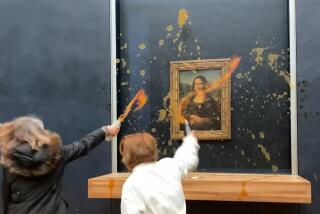PERSPECTIVE ON THE ARTS : A Creative Approach to Survival : Accept the demise of the national endowments and start a new entity designed, run and financed by artists.
The arts community ought to declare victorious defeat at the hands of the current Congress and give the vocal right-wing minority in the House the scalps--temporarily--of our two embattled national endowments for the arts and the humanities. The tepid compromise lately constructed in the Senate to “save” them is almost as bad as death itself: The deal cuts the pitifully low endowment funds almost in half, eliminates nearly all direct grants to artists, writers and scholars, and imposes a thick web of content restraints on the few programs allowed to survive.
But this isn’t the moment when those of us who make and care for the arts can afford to whine or weep. Rather, we should plan to rise again, like Prometheus Unbound. Even as we promote and defend what’s left of the endowments, let’s invent entirely new forms of support, free from the heavy censorial hand that ministries of culture always have placed on the arts. In retrospect, the years when our national endowments were free and vital (say, 1965 to 1990) represent a singular contradiction to this rule. We can’t hope to see those exceptional conditions again. We must reach out now to find an independent “third way,” in the manner of Ross Perot and the flood of new parties and activists across the U.S. seeking reform through referendums and proportional representation. A fresh, broad-based national movement encompassing artists, humanists and their allies in the sciences can put an end to the bipolar debates between those who want the government out of the arts and those who want it deep inside.
The source of the funds needed to nourish contemporary culture is less important than that the means of funding be creative. Artist James Pomeroy pointed out long ago that if the millions of self-declared artists and writers in America pooled their resources, they could establish their own “endowment.” Moving in precisely this direction in Chicago last fall, a national task force of arts advocates began to build a “trust for artists.” If this trust or a similar structure is managed by the creators of our culture in league with editors, dealers, publishers, curators, collectors, museum trustees and art-hungry parent-teacher groups, the heavy hand of outside control would be eliminated.
Why must this happen now? Because we’re nearing the collapse of the complex public-private coalition that renewed the arts in America in the past three decades. The losers will not be the arts’ traditional mainstay, the wealthy leisured classes, but the have-nots, the very students and other marginal groups who have expanded the cultural audience to the point that Americans now attend more arts-related events than sports. The beleaguered endowments have brought live theater, dance and provocative performance art out beyond New York, Boston and San Francisco into rural states and urban ghettos. In return, Latinos, blacks, Asian Americans and working-class whites have brought new forms of expression and tradition to the arts.
In closing down public support of the arts, the nation loses more than mere access; we also lose the bracing vitality of this new, post-elite culture. We lose money, too, even if we save tax dollars. The arts support millions of jobs and lately have returned $11 in taxes for every $1 appropriated to the endowments. And even the most generous of our big corporations won’t make up this slack, says a Rockefeller Foundation study. The private sector simply cannot afford to fund experimentation or research.
In this crisis, we need new models and brazen new ideas. The President’s Committee on the Arts and Humanities, funded by the private sector but managed and staffed by the White House, is one model. Some ingenious ideas also emerged recently on the floor of the Senate, when, surprisingly, Michigan conservative Spencer Abraham offered alternatives to the “lose-lose” funding compromise. Better to cut the endowments free of public funding gradually, he argued.
Meanwhile, a new, government-blessed “American arts and humanities foundation” could be funded by lotteries, and from tax breaks for contributors and even by a share in the profits from the ceremonies honoring the Oscars, Emmys and Tonys.
If some of these proposals are ridiculous as well as sublime, at least they break the mold. The arts community has to break out as well. We need to quit insisting on our spiritual superiority, our uniqueness, our sacred separation from potential allies in the sciences and business.
Our cause is larger than simply preserving vital grants. Unleashed creativity is essential to all of society, to education and industry, to the health and competitiveness of our entire economy. Until we learn to act forcefully in our own behalf, Congress will continue to chop away at all of us, the audience as well as the creators of the arts.
More to Read
The biggest entertainment stories
Get our big stories about Hollywood, film, television, music, arts, culture and more right in your inbox as soon as they publish.
You may occasionally receive promotional content from the Los Angeles Times.










